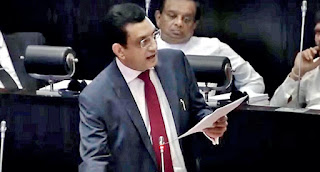Sri Lanka Trending English News - Latest international news headlines, pictures, and video
Sri Lanka’s foreign liquidity reserves critically low
Finance Minister Ali Sabry yesterday told Parliament that the country’s economy is at a critical level and warned that painful reforms lie ahead irrespective of who is in power.
In a detailed statement to the House on the present fiscal situation in the country as well as the way forward, Sabry admitted that wrong policies of the current administration had contributed to the present plight of the country, saying the tax cuts given in late 2019 after President Gotabaya Rajapaksa took office is a historic mistake.
“Revenue foregone due to the tax cuts introduced in late 2019, which was estimated to be more than Rs. 500 billion, has resulted in sovereign rating agencies to downgrade Sri Lanka to near default levels. In my opinion this is a historic mistake,” Sabry said.
He also said the 2022 Budget was no longer feasible and that the Government plans to present a new Budget shortly keeping with the new ground realities.
The Minister disclosed that the liquid reserves in the country are as low as $ 50 million. “As of now, the usable liquid reserves are at negligible levels, severely impacting importation of essentials, including fuel, LP gas and pharmaceuticals. I would not hesitate to inform this august assembly that the Government is struggling to find enough foreign exchange to finance these essential imports,” he said.
The Minister also said the delay in seeking assistance from the IMF was another factor that contributed to the present situation. “Sri Lanka should have focused on regaining capital market access by establishing a credible path of macroeconomic stabilisation, supported by institutions such as the IMF. But now, rather than trying to find fault, it is important to identify the reasons for this situation and concentrate on the way forward,” he said.
Sabry, who was in Washington, USA for discussions with the International Monetary Fund (IMF) said he is optimistic that the Fund could be concluded in about six months. “An IMF program will be a catalyst to undertake these much-needed reforms and will provide a signal to the rest of the world that we are serious in addressing our economic difficulties.
“But we must realise that the economic reform program we embark upon must be a program with Sri Lankan ownership. Without that Sri Lankan ownership, and without broad consensus of the Legislature, we would not succeed in providing permanent solutions for our longstanding economic issues,” he said.
Sabry said the public protests send the message that we need to be serious in providing professional and sustainable solutions and an important part of this is being transparent and forthright regarding the challenges ahead and the fact that there are no painless solutions to choose from.
“Oftentimes in Sri Lanka’s history, successive political actors have painted rosy pictures and made promises that lack realism and credibility. Every time there has been an attempt to establish long term solutions, these are reversed in the next election cycle with a promise of short-term benefits and relief. We see today the adverse outcome of these stop-go policies – and the public has rejected this as reflected in the protests we see today,” he said.
The Finance Minister said Sri Lanka must establish a broad political consensus on the economic path underpinned by fiscal and monetary discipline, a focus on enhancement of productivity, and ensuring equitable outcomes by protecting the most vulnerable sections of our society. “We must understand the root cause of the issue, i.e., the unsustainable fiscal policies adopted by many successive governments. We should be humble enough to accept the fact that we as a country have lived beyond our means,” he said.
Sabry said the fundamentals of the remedies are quite straightforward. “Manage expenditure within the framework of a reasonable revenue stream with a sustainable debt position, rather than placing the burden of a huge debt pile on generations to come. We should undertake reforms, to remove bottlenecks that hinder our economic progress.
“We must be futuristic and wise to make decisions in the name of the progress of the economy, progress of the country. The Parliament must give priority to implement tax reforms to increase Government revenue and rationalise expenditure whilst ensuring public investment in critical areas such as education, healthcare, and social protection,” he said.
Sri Lanka’s foreign liquidity reserves critically low
2022-05-05T06:56:00+05:30
aruna e
Economics
|
